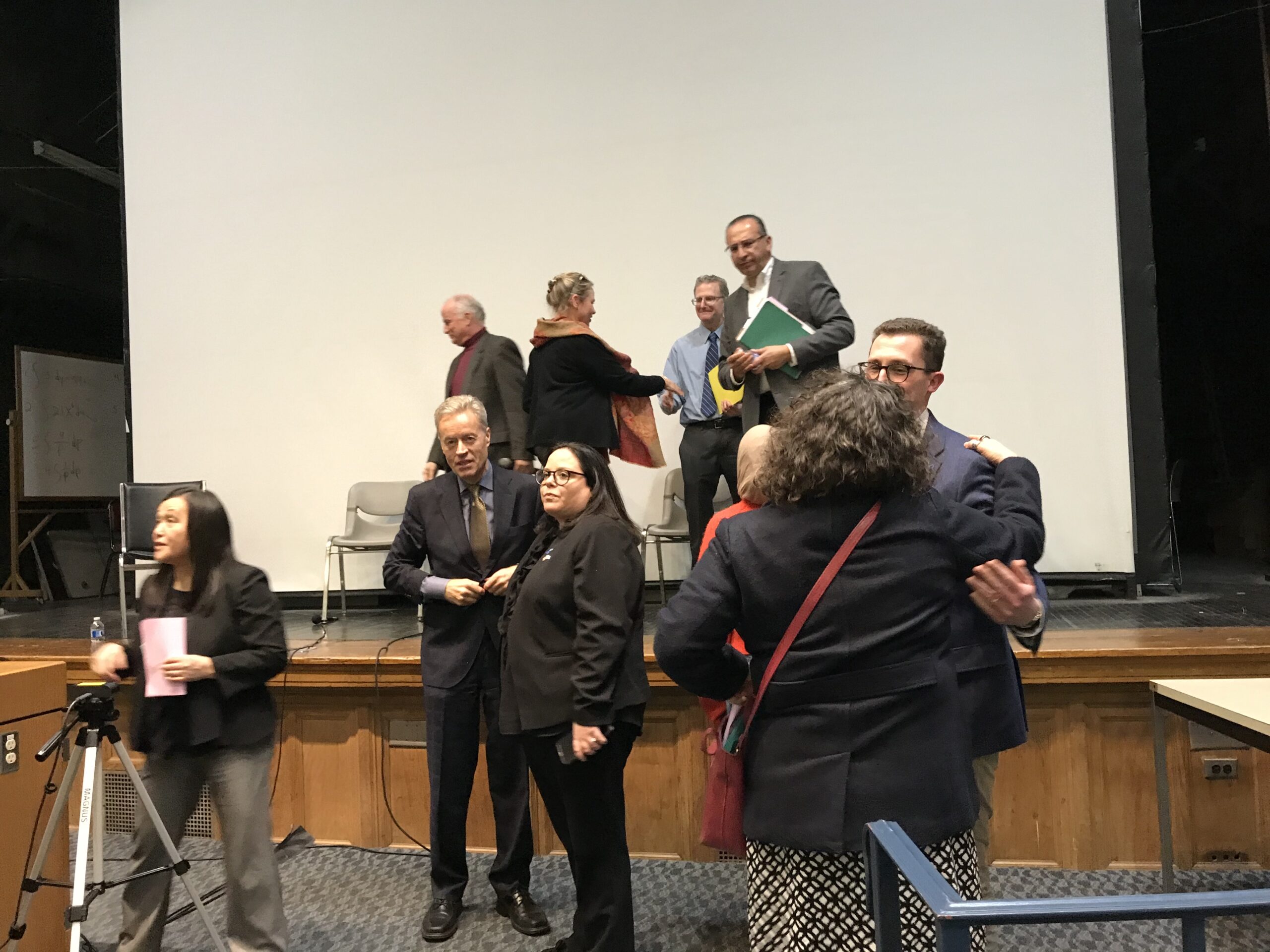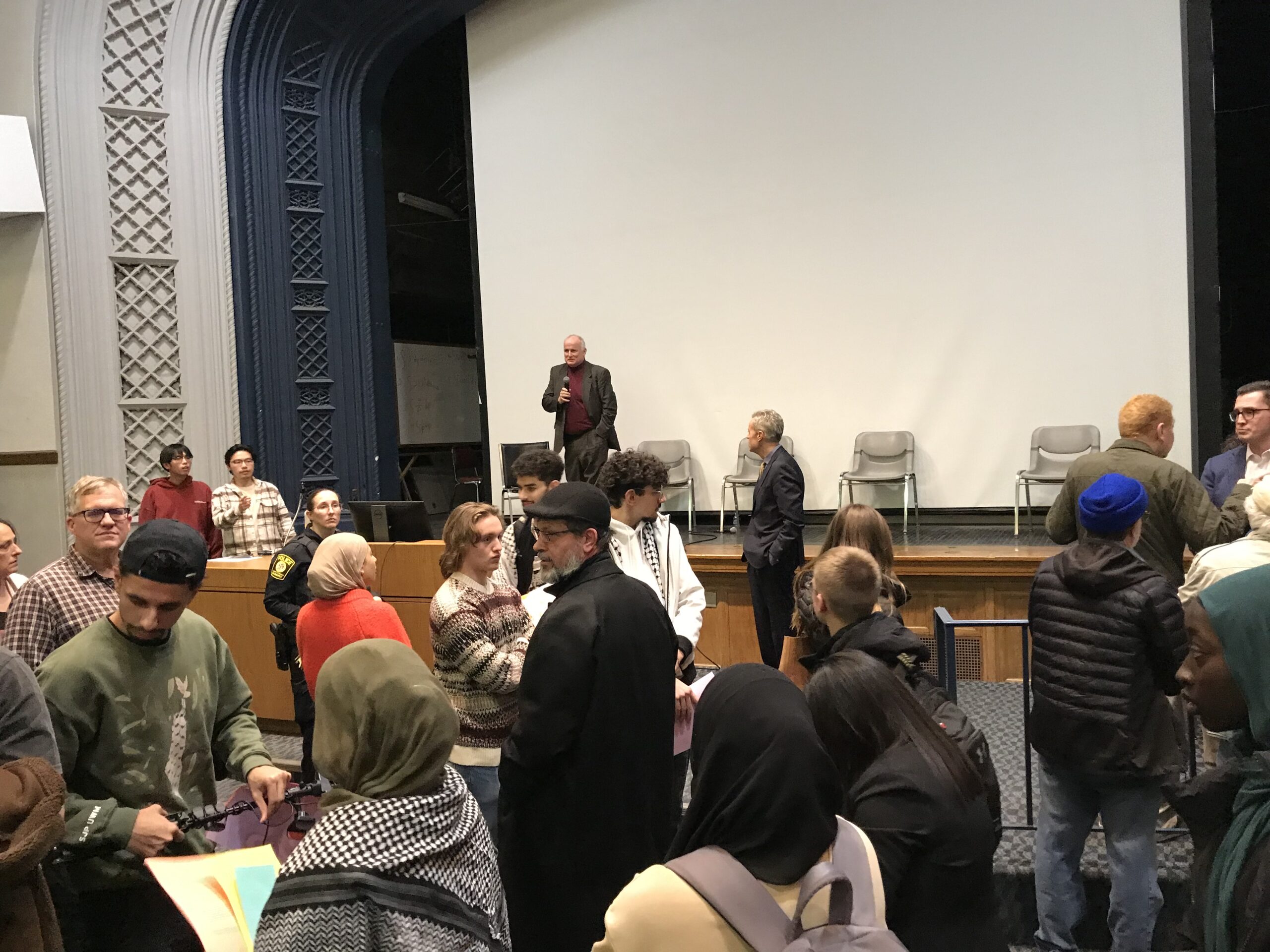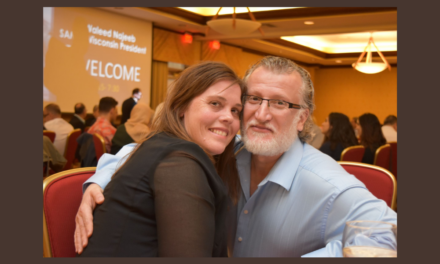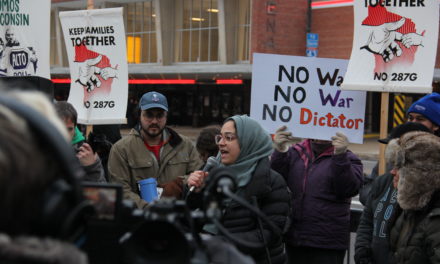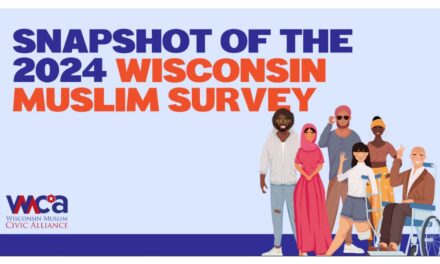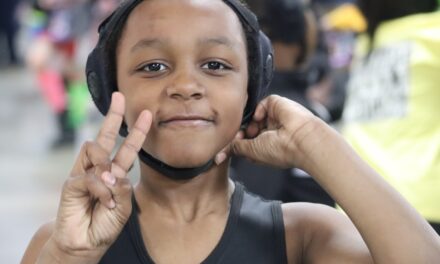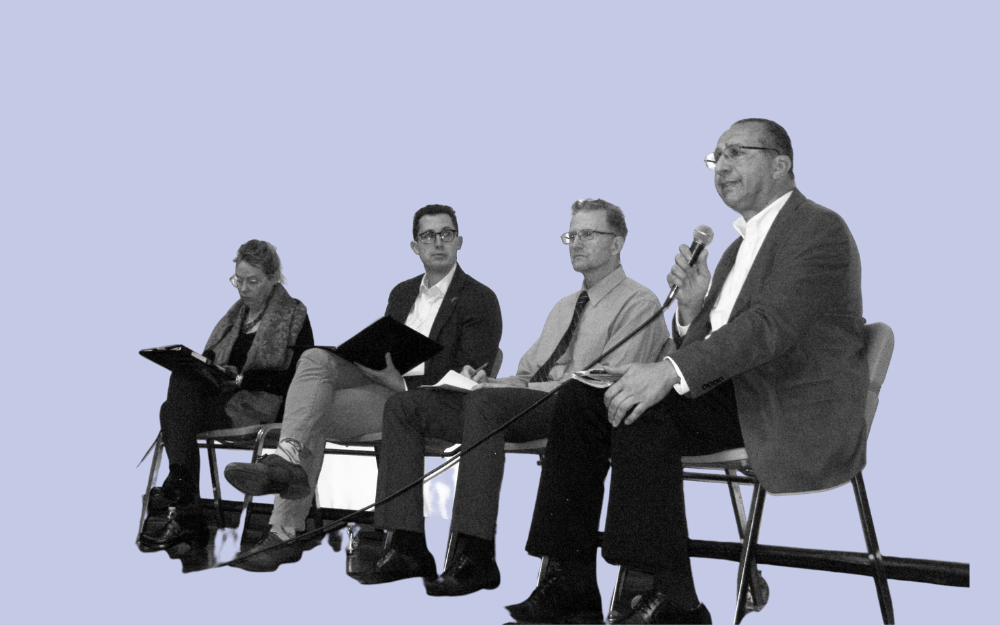
Photos by Cherrie Hanson
(Left-right) Professor Caroline Seymour-Jorn; Rabbi Joshua Herman, executive director of Hillel Milwaukee; Professor Shale Horowitz, Ph.D.; and Othman Atta, executive director of the Islamic Society of Milwaukee participate in the first major discussion at a Wisconsin university on the Palestinian-Israeli conflict.
As universities across the country struggle to navigate tensions between pro-Palestinian and pro-Israeli supporters in their communities, with many opting to shut down challenging discussions, the University of Wisconsin-Milwaukee is promoting constructive dialogue.
Almost 400 UWM students, faculty and staff, and Greater Milwaukee community members attended its program Tuesday, Conversation on the Palestinian-Israeli Conflict. It featured a panel that included Othman Atta, executive director of the Islamic Society of Milwaukee; Rabbi Joshua Herman, executive director of Hillel Milwaukee, which serves Jewish students at 11 Milwaukee area colleges and universities; Professor of Global Studies Caroline Seymour-Jorn, Ph.D., and Professor of Political Science Shale Horowitz, Ph.D.
“This panel will explore the context for the fast-moving events in Israel and Gaza,” said the program announcement. “It will also provide an opportunity for civil and respectful discourse around this deeply divisive conflict, deepening our commitment to shared values and laying the foundation for future events on this important subject.”
“When we began planning this, I said 100 attendees would be a success,” said UWM Vice Chancellor Chia Vang, Ph.D., in an interview with the Wisconsin Muslim Journal on Tuesday afternoon, before the event. “We have almost 350 registered. That’s why we have to move from the Lubar Entrepreneurship Center to the big Engelmann lecture hall (which seats 400).” That evening, almost every seat was filled. Following the event, Vang confirmed more than 370 people attended.
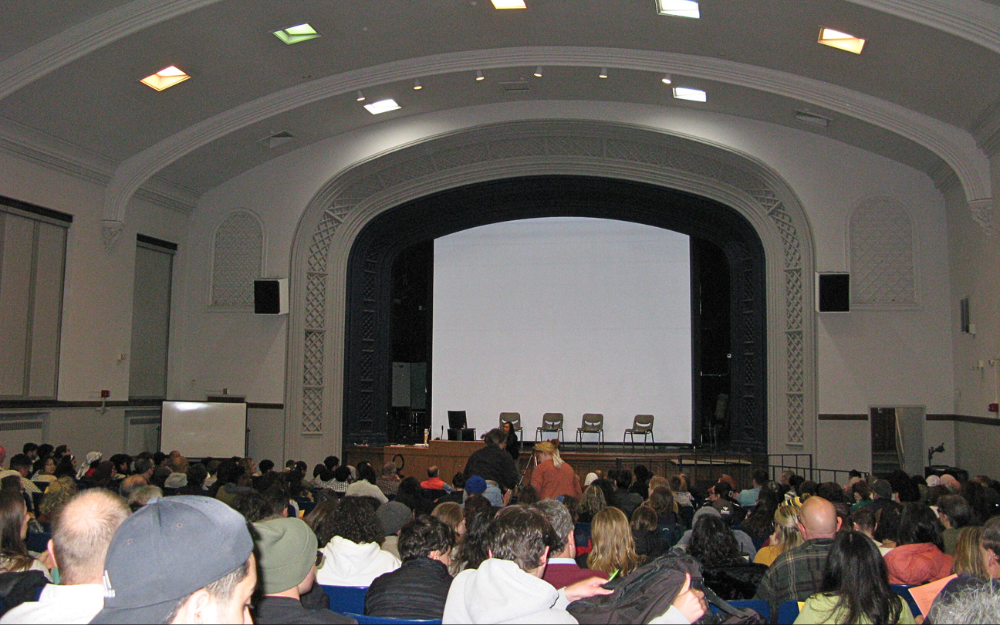
A capacity crowd filled a large lecture hall at the University of Wisconsin-Milwaukee to discuss different perspectives on the Palestinian-Israeli conflict.
The panel discussion lasted more than an hour, as different factions of a polarized audience cheered points they supported, heckled speakers and sometimes yelled at each other. Several pro-Palestinian supporters held up palms painted red.
Moderator Doug Savage, director of UWM’s Institute for World Affairs, occasionally called for order from the audience, once saying, “Can we limit the demonstrations? You can do that. You just can’t do it in here.”
Organizers said they anticipated the elevated emotional level of the event. “The tense conversation reflected the complexity of this conflict,” Vang said. “I know it was emotional for many. I am grateful that people with very different viewpoints were willing to be in the same room.”
“It went as we expected,” Savage told WMJ at the close of the evening, while security guards asked panelists if they wanted escorts to their cars.
“Recognizing the highly charged history behind the conflict, I hope it is still possible for people in our community to have constructive dialogue. That was my goal for the event,” he wrote in an emailed response to a follow-up question. “I believe it is important that we not generalize the actions of Hamas or the Netanyahu government as representative of the entire Muslim or Jewish communities.”
See the UWM Conversation on the Palestinian-Israeli Conflict here on the Wisconsin Coalition for Justice in Palestine YouTube channel.
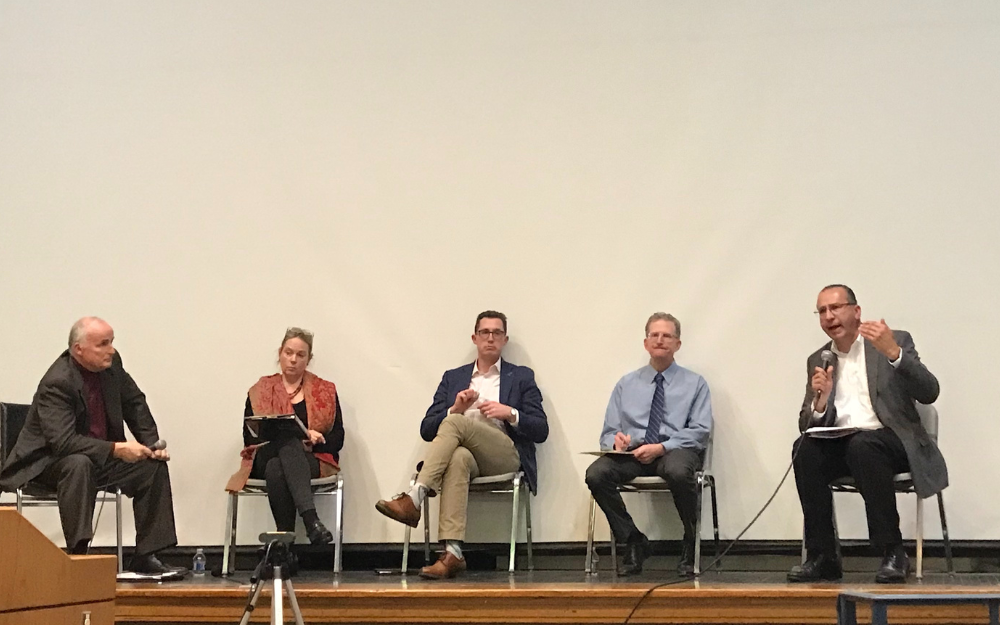
UWM Institute of World Affairs Director Douglas Savage (far left) moderated the panel on the Palestinian-Israeli conflict.
A unique role to play
Before responding to the first question of the evening, ISM executive director Atta said, “I’d like to really thank the University of Wisconsin-Milwaukee and its chancellor for giving us all this opportunity. It’s really great when a university does what a university’s supposed to do, which is to debate important topics rather than trying to censor individuals or only present one narrative.”
UWM Chancellor Mark A. Mone, Ph.D., who attended the event, wrote in an Oct. 16 letter to the UWM community about UWM’s role in addressing the Palestinian-Israeli conflict. “We are uniquely positioned with an expressed mission aimed at research and access, and we have a deep commitment to our students, employees and community’s health, safety and well-being,” he wrote. “As the largest public research university in the region, with national recognition in research and community engagement, our Guiding Values have influence and impact.
“These Guiding Values are not merely aspirational but describe the expected behaviors of all on our campus and communities. With 23,000 students and 3,400 employees spread across several campuses in the region and with more than 200,000 alumni globally, we are a force for good in a world that desperately needs mutual respect and safety, global equity, appreciation of diversity and ethical behavior.
“Students rallied for Palestinian freedom in Spaights Plaza, and others gathered at Hillel to grieve with one another. UWM is their home and your home, and you have the right to speak up on your campus. I hope you continue to keep that freedom of speech sacred for your colleagues and classmates in the days to come.”
Mone called the “current Israeli-Hamas conflict,” with “the violence against children and other innocent people, the shocking brutality unleashed and the significant escalation of hostilities … one of the great tragedies of modern times.” He announced that UWM is planning educational forums for employees, students and the community, of which Tuesday evening’s event was the first.
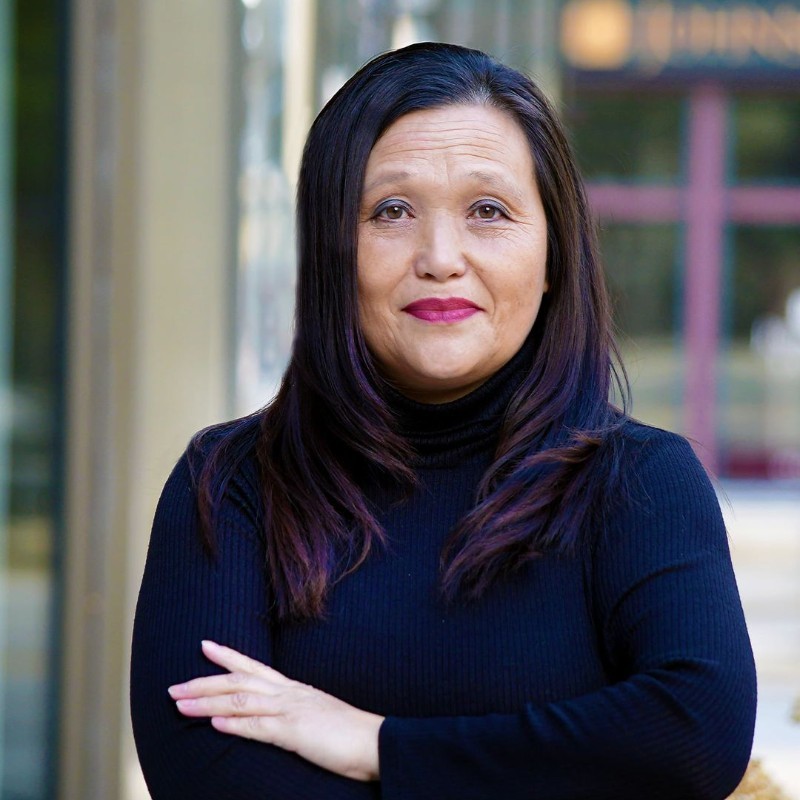
Chia Youyee Vang, Ph.D., UWM Vice Chancellor for Diversity, Equity and Inclusion
“We seek to enhance our understanding and knowledge of the longstanding conflicts in the Middle East and create space for constructive dialogue,” Mone wrote. “We will promote behaviors and actions aimed at prosperity for all and driving toward the escalation of peace.”
“We are a learning institution,” Vang said in the pre-event interview. “Chancellor Mone committed to coordinating and planning educational spaces and I was charged to lead that effort.” Vang is both vice chancellor for Diversity, Equity and Inclusion and a professor of history.
UWM’s Division of Diversity, Equity and Inclusion, its Institute of World Affairs and Master of Sustainable Peacebuilding program organized Tuesday’s event.
Vang said the event is also important to her on a personal level. “I was a refugee. We were in Laos and we had to run for our lives. I know how I felt, sitting in my house in Northern Laos having my village bombed. I’m not only an academic; I am someone who has experienced being in a war zone.”
Talking through the tension
UWM’s planning and preparations for the Conversation on the Palestinian-Israeli Conflict aimed to reduce tension in the discussion of this emotional topic, knowing there would be panelists and audience members in the room who had lost friends and relatives in the current conflict. Prior to the event, panelists agreed to the following discussion norms:
- Commit to learning, not debating. The goal is to gain deeper understanding.
- Allow everyone the chance to speak.
- Practice active listening.
- Speak from your personal experience.
- Be willing to experience discomfort and vulnerability.
- Be present.
- Refrain from personal attacks and inflammatory language—focus on ideas.
The organizers had slips of paper distributed to everyone in the audience as a means of collecting questions rather than pass around a microphone in order to moderate the tenor and appropriateness of questions. As it happened, time ran out before audience’s questions were addressed. However, they were collected and will be used in future programs, organizers announced.
Panelists addressed four questions:
- What are the historical roots of the Palestinian-Israeli conflict?
- Why do events so far away from here have such resonance for people living here?
- What would make dialogue possible?
- What could the university do going forward?
Watch for Tuesday’s story on the differing perspectives and important takeaways from UWM’s Conversation on the Palestinian-Israeli Conflict.
